AI in Accounting Corporations: A Case Study on Deloitte's Applications
VerifiedAdded on 2023/01/10
|52
|18833
|93
Case Study
AI Summary
This case study investigates the uses and applications of Artificial Intelligence (AI) within accounting corporations, focusing on Deloitte. It begins by defining AI as the simulation of human intelligence in machines, emphasizing its learning and problem-solving capabilities. The study highlights the increasing adoption of cloud computing and AI technologies like machine learning and robotic process automation in the accounting industry. It identifies applications such as automated data extraction, accounts receivable and payable processing, fraud detection, and complex document analysis. The research employs a qualitative method, using primary and secondary data collection, with a simple random sample of 20 accounting managers from Deloitte. The study explores both weak and strong AI, the benefits of AI in streamlining operations, detecting inaccuracies, and empowering quick decision-making. It also addresses challenges, such as the potential for human carelessness in reviewing AI-generated reports. The research concludes with recommendations for complying AI with newer software and encrypting data to improve operational efficiency.
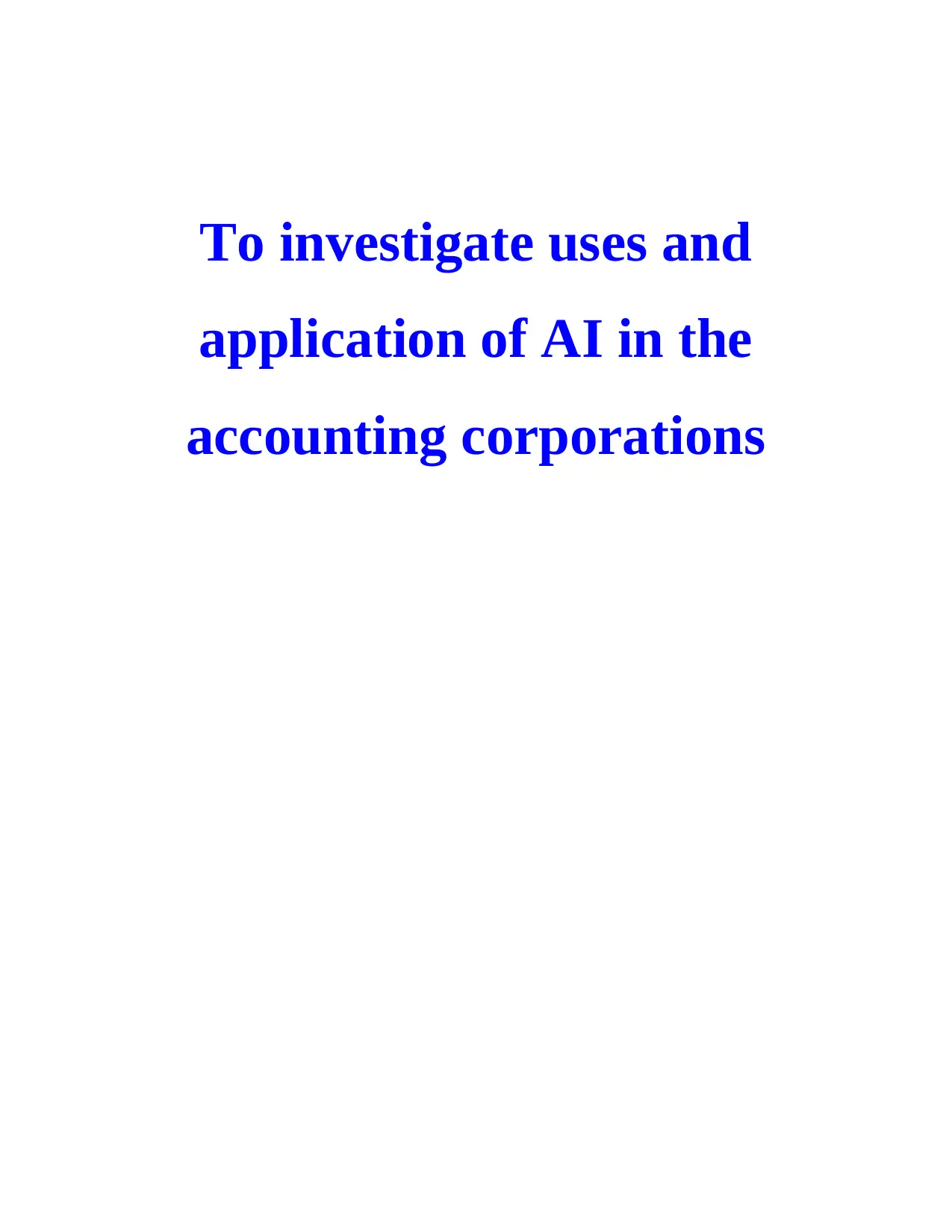
To investigate uses and
application of AI in the
accounting corporations
application of AI in the
accounting corporations
Paraphrase This Document
Need a fresh take? Get an instant paraphrase of this document with our AI Paraphraser
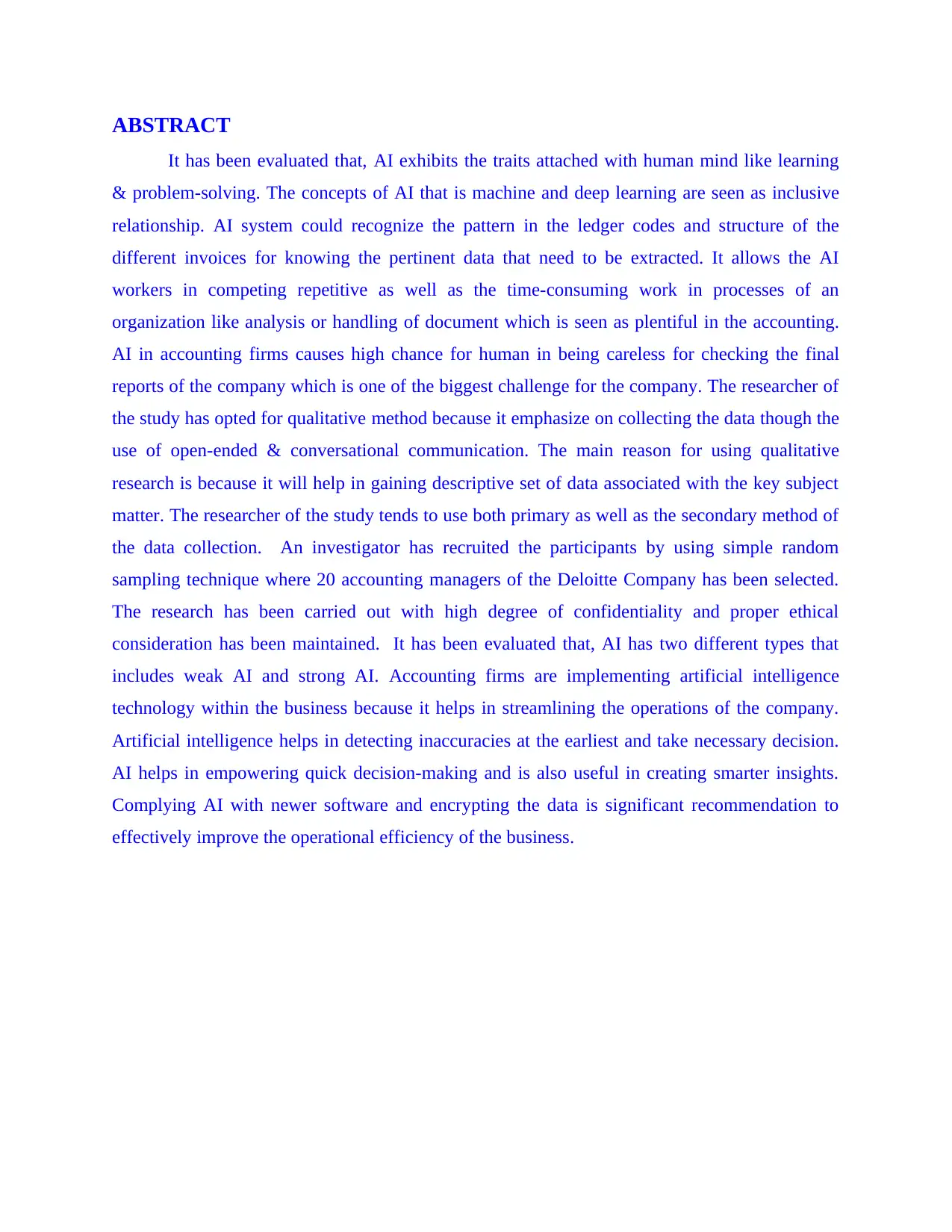
ABSTRACT
It has been evaluated that, AI exhibits the traits attached with human mind like learning
& problem-solving. The concepts of AI that is machine and deep learning are seen as inclusive
relationship. AI system could recognize the pattern in the ledger codes and structure of the
different invoices for knowing the pertinent data that need to be extracted. It allows the AI
workers in competing repetitive as well as the time-consuming work in processes of an
organization like analysis or handling of document which is seen as plentiful in the accounting.
AI in accounting firms causes high chance for human in being careless for checking the final
reports of the company which is one of the biggest challenge for the company. The researcher of
the study has opted for qualitative method because it emphasize on collecting the data though the
use of open-ended & conversational communication. The main reason for using qualitative
research is because it will help in gaining descriptive set of data associated with the key subject
matter. The researcher of the study tends to use both primary as well as the secondary method of
the data collection. An investigator has recruited the participants by using simple random
sampling technique where 20 accounting managers of the Deloitte Company has been selected.
The research has been carried out with high degree of confidentiality and proper ethical
consideration has been maintained. It has been evaluated that, AI has two different types that
includes weak AI and strong AI. Accounting firms are implementing artificial intelligence
technology within the business because it helps in streamlining the operations of the company.
Artificial intelligence helps in detecting inaccuracies at the earliest and take necessary decision.
AI helps in empowering quick decision-making and is also useful in creating smarter insights.
Complying AI with newer software and encrypting the data is significant recommendation to
effectively improve the operational efficiency of the business.
It has been evaluated that, AI exhibits the traits attached with human mind like learning
& problem-solving. The concepts of AI that is machine and deep learning are seen as inclusive
relationship. AI system could recognize the pattern in the ledger codes and structure of the
different invoices for knowing the pertinent data that need to be extracted. It allows the AI
workers in competing repetitive as well as the time-consuming work in processes of an
organization like analysis or handling of document which is seen as plentiful in the accounting.
AI in accounting firms causes high chance for human in being careless for checking the final
reports of the company which is one of the biggest challenge for the company. The researcher of
the study has opted for qualitative method because it emphasize on collecting the data though the
use of open-ended & conversational communication. The main reason for using qualitative
research is because it will help in gaining descriptive set of data associated with the key subject
matter. The researcher of the study tends to use both primary as well as the secondary method of
the data collection. An investigator has recruited the participants by using simple random
sampling technique where 20 accounting managers of the Deloitte Company has been selected.
The research has been carried out with high degree of confidentiality and proper ethical
consideration has been maintained. It has been evaluated that, AI has two different types that
includes weak AI and strong AI. Accounting firms are implementing artificial intelligence
technology within the business because it helps in streamlining the operations of the company.
Artificial intelligence helps in detecting inaccuracies at the earliest and take necessary decision.
AI helps in empowering quick decision-making and is also useful in creating smarter insights.
Complying AI with newer software and encrypting the data is significant recommendation to
effectively improve the operational efficiency of the business.
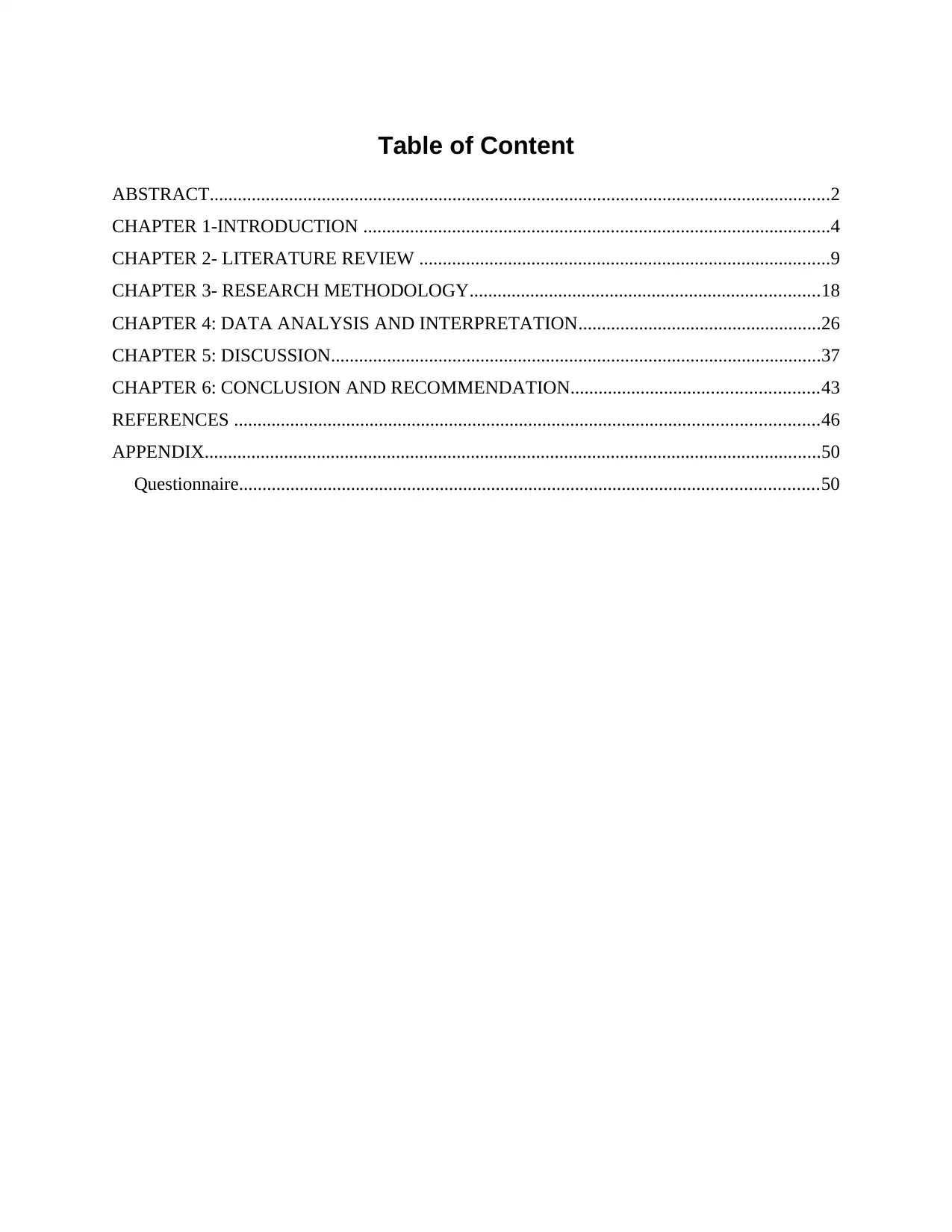
Table of Content
ABSTRACT.....................................................................................................................................2
CHAPTER 1-INTRODUCTION ....................................................................................................4
CHAPTER 2- LITERATURE REVIEW ........................................................................................9
CHAPTER 3- RESEARCH METHODOLOGY...........................................................................18
CHAPTER 4: DATA ANALYSIS AND INTERPRETATION....................................................26
CHAPTER 5: DISCUSSION.........................................................................................................37
CHAPTER 6: CONCLUSION AND RECOMMENDATION.....................................................43
REFERENCES .............................................................................................................................46
APPENDIX....................................................................................................................................50
Questionnaire............................................................................................................................50
ABSTRACT.....................................................................................................................................2
CHAPTER 1-INTRODUCTION ....................................................................................................4
CHAPTER 2- LITERATURE REVIEW ........................................................................................9
CHAPTER 3- RESEARCH METHODOLOGY...........................................................................18
CHAPTER 4: DATA ANALYSIS AND INTERPRETATION....................................................26
CHAPTER 5: DISCUSSION.........................................................................................................37
CHAPTER 6: CONCLUSION AND RECOMMENDATION.....................................................43
REFERENCES .............................................................................................................................46
APPENDIX....................................................................................................................................50
Questionnaire............................................................................................................................50
⊘ This is a preview!⊘
Do you want full access?
Subscribe today to unlock all pages.

Trusted by 1+ million students worldwide
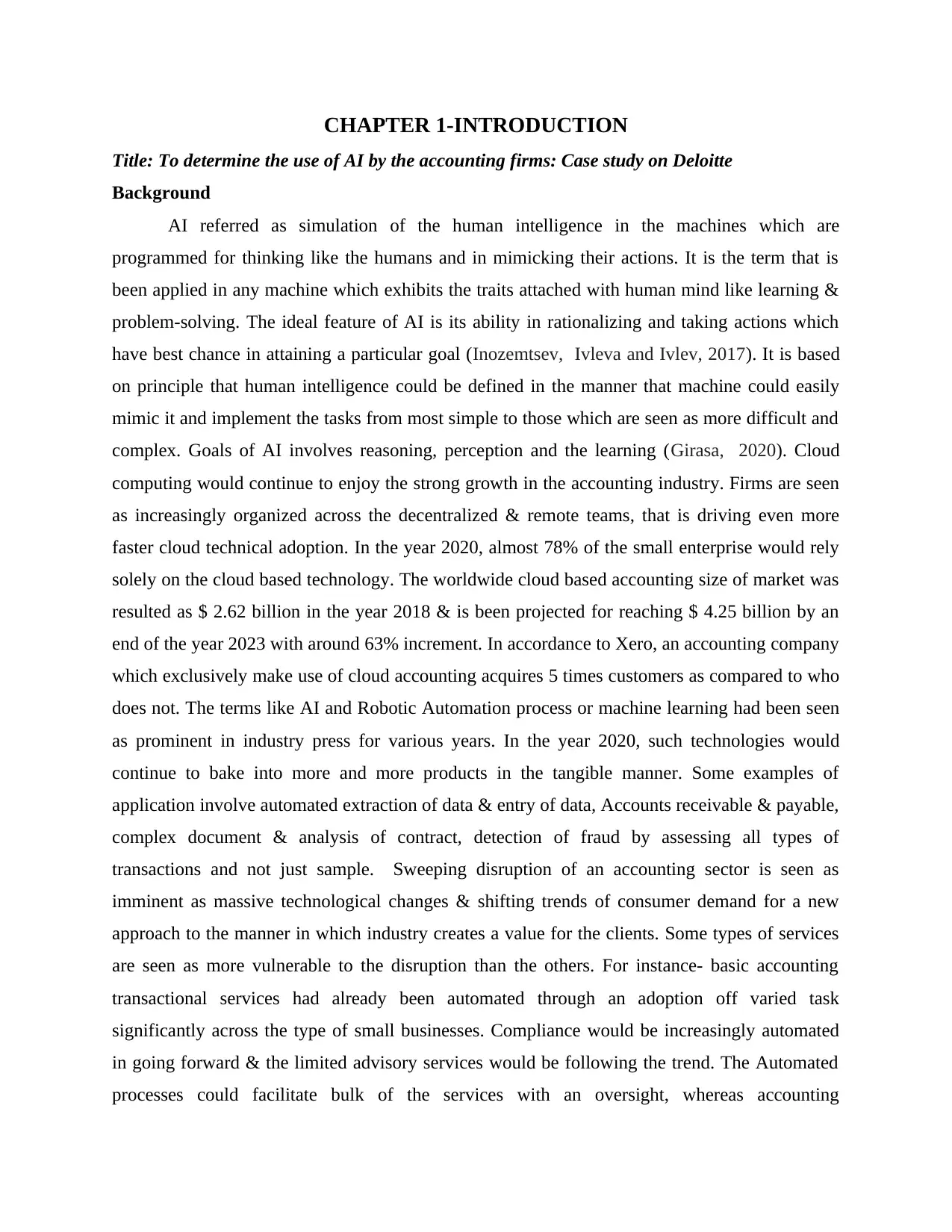
CHAPTER 1-INTRODUCTION
Title: To determine the use of AI by the accounting firms: Case study on Deloitte
Background
AI referred as simulation of the human intelligence in the machines which are
programmed for thinking like the humans and in mimicking their actions. It is the term that is
been applied in any machine which exhibits the traits attached with human mind like learning &
problem-solving. The ideal feature of AI is its ability in rationalizing and taking actions which
have best chance in attaining a particular goal (Inozemtsev, Ivleva and Ivlev, 2017). It is based
on principle that human intelligence could be defined in the manner that machine could easily
mimic it and implement the tasks from most simple to those which are seen as more difficult and
complex. Goals of AI involves reasoning, perception and the learning (Girasa, 2020). Cloud
computing would continue to enjoy the strong growth in the accounting industry. Firms are seen
as increasingly organized across the decentralized & remote teams, that is driving even more
faster cloud technical adoption. In the year 2020, almost 78% of the small enterprise would rely
solely on the cloud based technology. The worldwide cloud based accounting size of market was
resulted as $ 2.62 billion in the year 2018 & is been projected for reaching $ 4.25 billion by an
end of the year 2023 with around 63% increment. In accordance to Xero, an accounting company
which exclusively make use of cloud accounting acquires 5 times customers as compared to who
does not. The terms like AI and Robotic Automation process or machine learning had been seen
as prominent in industry press for various years. In the year 2020, such technologies would
continue to bake into more and more products in the tangible manner. Some examples of
application involve automated extraction of data & entry of data, Accounts receivable & payable,
complex document & analysis of contract, detection of fraud by assessing all types of
transactions and not just sample. Sweeping disruption of an accounting sector is seen as
imminent as massive technological changes & shifting trends of consumer demand for a new
approach to the manner in which industry creates a value for the clients. Some types of services
are seen as more vulnerable to the disruption than the others. For instance- basic accounting
transactional services had already been automated through an adoption off varied task
significantly across the type of small businesses. Compliance would be increasingly automated
in going forward & the limited advisory services would be following the trend. The Automated
processes could facilitate bulk of the services with an oversight, whereas accounting
Title: To determine the use of AI by the accounting firms: Case study on Deloitte
Background
AI referred as simulation of the human intelligence in the machines which are
programmed for thinking like the humans and in mimicking their actions. It is the term that is
been applied in any machine which exhibits the traits attached with human mind like learning &
problem-solving. The ideal feature of AI is its ability in rationalizing and taking actions which
have best chance in attaining a particular goal (Inozemtsev, Ivleva and Ivlev, 2017). It is based
on principle that human intelligence could be defined in the manner that machine could easily
mimic it and implement the tasks from most simple to those which are seen as more difficult and
complex. Goals of AI involves reasoning, perception and the learning (Girasa, 2020). Cloud
computing would continue to enjoy the strong growth in the accounting industry. Firms are seen
as increasingly organized across the decentralized & remote teams, that is driving even more
faster cloud technical adoption. In the year 2020, almost 78% of the small enterprise would rely
solely on the cloud based technology. The worldwide cloud based accounting size of market was
resulted as $ 2.62 billion in the year 2018 & is been projected for reaching $ 4.25 billion by an
end of the year 2023 with around 63% increment. In accordance to Xero, an accounting company
which exclusively make use of cloud accounting acquires 5 times customers as compared to who
does not. The terms like AI and Robotic Automation process or machine learning had been seen
as prominent in industry press for various years. In the year 2020, such technologies would
continue to bake into more and more products in the tangible manner. Some examples of
application involve automated extraction of data & entry of data, Accounts receivable & payable,
complex document & analysis of contract, detection of fraud by assessing all types of
transactions and not just sample. Sweeping disruption of an accounting sector is seen as
imminent as massive technological changes & shifting trends of consumer demand for a new
approach to the manner in which industry creates a value for the clients. Some types of services
are seen as more vulnerable to the disruption than the others. For instance- basic accounting
transactional services had already been automated through an adoption off varied task
significantly across the type of small businesses. Compliance would be increasingly automated
in going forward & the limited advisory services would be following the trend. The Automated
processes could facilitate bulk of the services with an oversight, whereas accounting
Paraphrase This Document
Need a fresh take? Get an instant paraphrase of this document with our AI Paraphraser
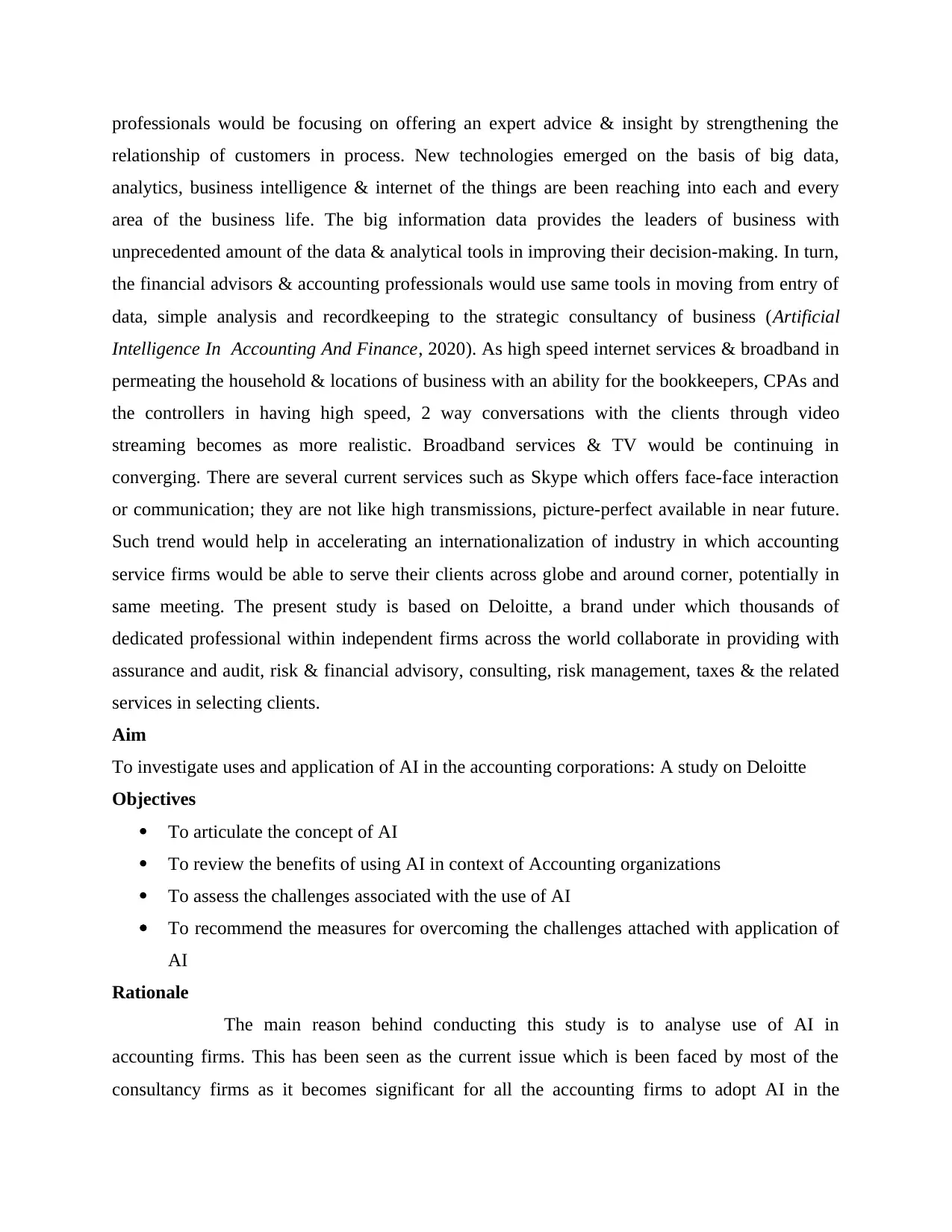
professionals would be focusing on offering an expert advice & insight by strengthening the
relationship of customers in process. New technologies emerged on the basis of big data,
analytics, business intelligence & internet of the things are been reaching into each and every
area of the business life. The big information data provides the leaders of business with
unprecedented amount of the data & analytical tools in improving their decision-making. In turn,
the financial advisors & accounting professionals would use same tools in moving from entry of
data, simple analysis and recordkeeping to the strategic consultancy of business (Artificial
Intelligence In Accounting And Finance, 2020). As high speed internet services & broadband in
permeating the household & locations of business with an ability for the bookkeepers, CPAs and
the controllers in having high speed, 2 way conversations with the clients through video
streaming becomes as more realistic. Broadband services & TV would be continuing in
converging. There are several current services such as Skype which offers face-face interaction
or communication; they are not like high transmissions, picture-perfect available in near future.
Such trend would help in accelerating an internationalization of industry in which accounting
service firms would be able to serve their clients across globe and around corner, potentially in
same meeting. The present study is based on Deloitte, a brand under which thousands of
dedicated professional within independent firms across the world collaborate in providing with
assurance and audit, risk & financial advisory, consulting, risk management, taxes & the related
services in selecting clients.
Aim
To investigate uses and application of AI in the accounting corporations: A study on Deloitte
Objectives
To articulate the concept of AI
To review the benefits of using AI in context of Accounting organizations
To assess the challenges associated with the use of AI
To recommend the measures for overcoming the challenges attached with application of
AI
Rationale
The main reason behind conducting this study is to analyse use of AI in
accounting firms. This has been seen as the current issue which is been faced by most of the
consultancy firms as it becomes significant for all the accounting firms to adopt AI in the
relationship of customers in process. New technologies emerged on the basis of big data,
analytics, business intelligence & internet of the things are been reaching into each and every
area of the business life. The big information data provides the leaders of business with
unprecedented amount of the data & analytical tools in improving their decision-making. In turn,
the financial advisors & accounting professionals would use same tools in moving from entry of
data, simple analysis and recordkeeping to the strategic consultancy of business (Artificial
Intelligence In Accounting And Finance, 2020). As high speed internet services & broadband in
permeating the household & locations of business with an ability for the bookkeepers, CPAs and
the controllers in having high speed, 2 way conversations with the clients through video
streaming becomes as more realistic. Broadband services & TV would be continuing in
converging. There are several current services such as Skype which offers face-face interaction
or communication; they are not like high transmissions, picture-perfect available in near future.
Such trend would help in accelerating an internationalization of industry in which accounting
service firms would be able to serve their clients across globe and around corner, potentially in
same meeting. The present study is based on Deloitte, a brand under which thousands of
dedicated professional within independent firms across the world collaborate in providing with
assurance and audit, risk & financial advisory, consulting, risk management, taxes & the related
services in selecting clients.
Aim
To investigate uses and application of AI in the accounting corporations: A study on Deloitte
Objectives
To articulate the concept of AI
To review the benefits of using AI in context of Accounting organizations
To assess the challenges associated with the use of AI
To recommend the measures for overcoming the challenges attached with application of
AI
Rationale
The main reason behind conducting this study is to analyse use of AI in
accounting firms. This has been seen as the current issue which is been faced by most of the
consultancy firms as it becomes significant for all the accounting firms to adopt AI in the
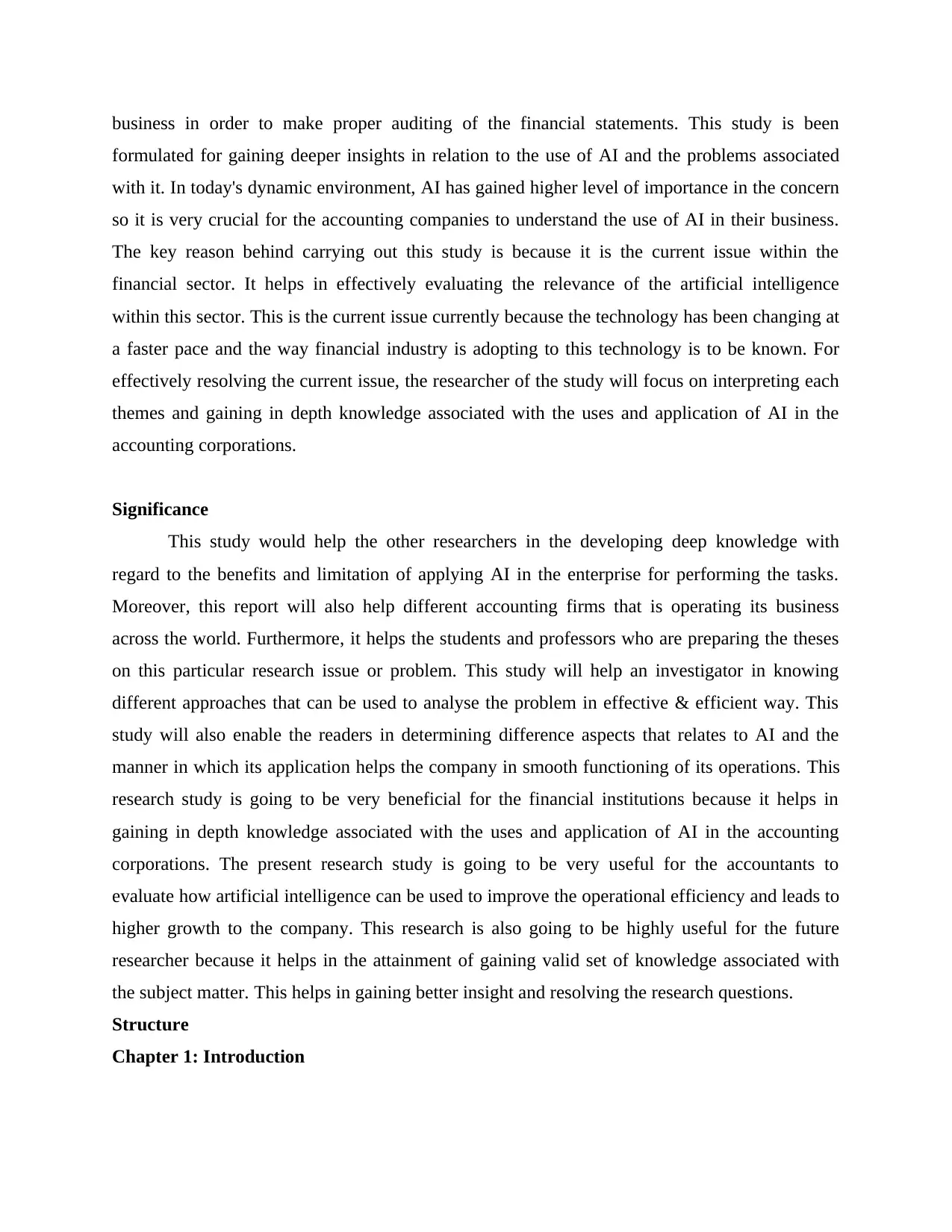
business in order to make proper auditing of the financial statements. This study is been
formulated for gaining deeper insights in relation to the use of AI and the problems associated
with it. In today's dynamic environment, AI has gained higher level of importance in the concern
so it is very crucial for the accounting companies to understand the use of AI in their business.
The key reason behind carrying out this study is because it is the current issue within the
financial sector. It helps in effectively evaluating the relevance of the artificial intelligence
within this sector. This is the current issue currently because the technology has been changing at
a faster pace and the way financial industry is adopting to this technology is to be known. For
effectively resolving the current issue, the researcher of the study will focus on interpreting each
themes and gaining in depth knowledge associated with the uses and application of AI in the
accounting corporations.
Significance
This study would help the other researchers in the developing deep knowledge with
regard to the benefits and limitation of applying AI in the enterprise for performing the tasks.
Moreover, this report will also help different accounting firms that is operating its business
across the world. Furthermore, it helps the students and professors who are preparing the theses
on this particular research issue or problem. This study will help an investigator in knowing
different approaches that can be used to analyse the problem in effective & efficient way. This
study will also enable the readers in determining difference aspects that relates to AI and the
manner in which its application helps the company in smooth functioning of its operations. This
research study is going to be very beneficial for the financial institutions because it helps in
gaining in depth knowledge associated with the uses and application of AI in the accounting
corporations. The present research study is going to be very useful for the accountants to
evaluate how artificial intelligence can be used to improve the operational efficiency and leads to
higher growth to the company. This research is also going to be highly useful for the future
researcher because it helps in the attainment of gaining valid set of knowledge associated with
the subject matter. This helps in gaining better insight and resolving the research questions.
Structure
Chapter 1: Introduction
formulated for gaining deeper insights in relation to the use of AI and the problems associated
with it. In today's dynamic environment, AI has gained higher level of importance in the concern
so it is very crucial for the accounting companies to understand the use of AI in their business.
The key reason behind carrying out this study is because it is the current issue within the
financial sector. It helps in effectively evaluating the relevance of the artificial intelligence
within this sector. This is the current issue currently because the technology has been changing at
a faster pace and the way financial industry is adopting to this technology is to be known. For
effectively resolving the current issue, the researcher of the study will focus on interpreting each
themes and gaining in depth knowledge associated with the uses and application of AI in the
accounting corporations.
Significance
This study would help the other researchers in the developing deep knowledge with
regard to the benefits and limitation of applying AI in the enterprise for performing the tasks.
Moreover, this report will also help different accounting firms that is operating its business
across the world. Furthermore, it helps the students and professors who are preparing the theses
on this particular research issue or problem. This study will help an investigator in knowing
different approaches that can be used to analyse the problem in effective & efficient way. This
study will also enable the readers in determining difference aspects that relates to AI and the
manner in which its application helps the company in smooth functioning of its operations. This
research study is going to be very beneficial for the financial institutions because it helps in
gaining in depth knowledge associated with the uses and application of AI in the accounting
corporations. The present research study is going to be very useful for the accountants to
evaluate how artificial intelligence can be used to improve the operational efficiency and leads to
higher growth to the company. This research is also going to be highly useful for the future
researcher because it helps in the attainment of gaining valid set of knowledge associated with
the subject matter. This helps in gaining better insight and resolving the research questions.
Structure
Chapter 1: Introduction
⊘ This is a preview!⊘
Do you want full access?
Subscribe today to unlock all pages.

Trusted by 1+ million students worldwide
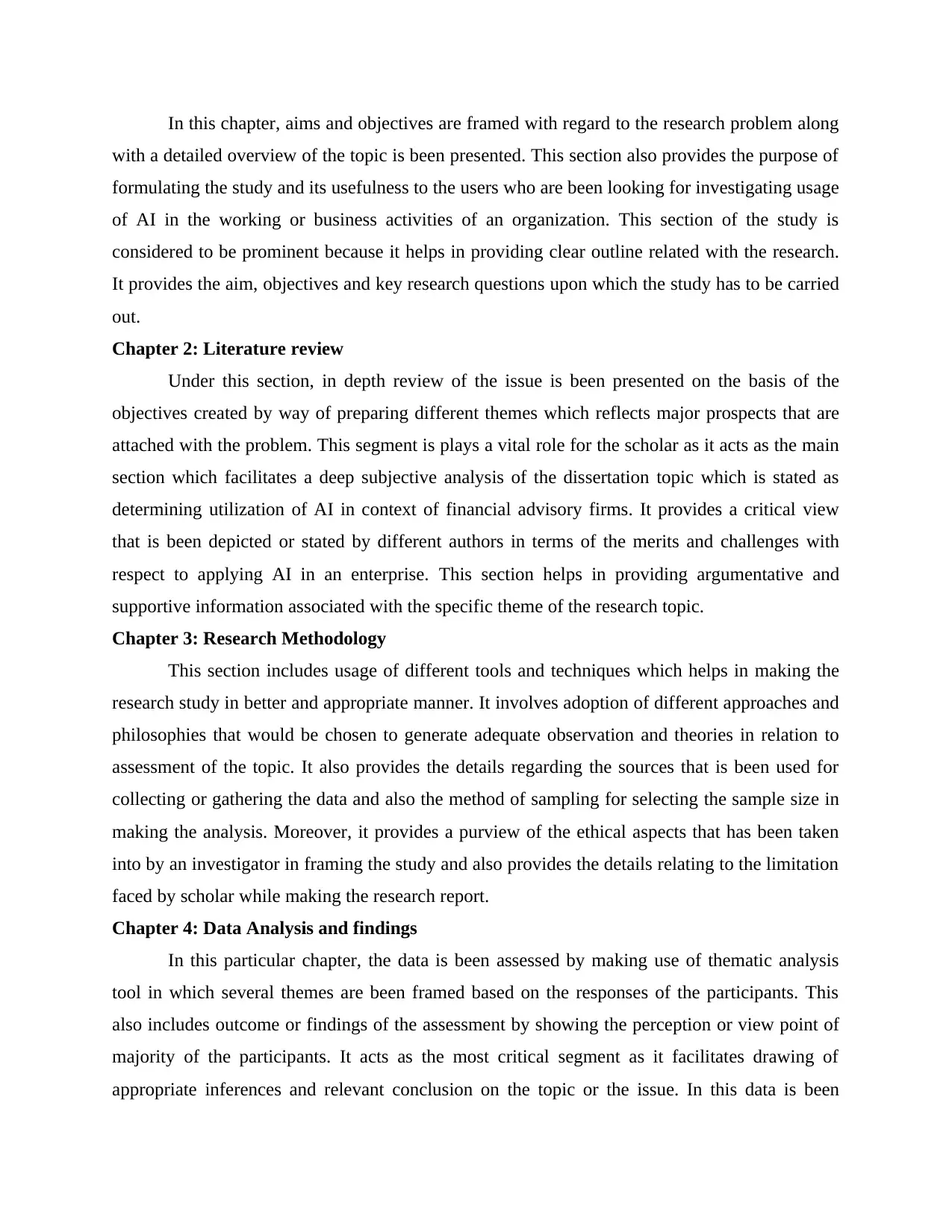
In this chapter, aims and objectives are framed with regard to the research problem along
with a detailed overview of the topic is been presented. This section also provides the purpose of
formulating the study and its usefulness to the users who are been looking for investigating usage
of AI in the working or business activities of an organization. This section of the study is
considered to be prominent because it helps in providing clear outline related with the research.
It provides the aim, objectives and key research questions upon which the study has to be carried
out.
Chapter 2: Literature review
Under this section, in depth review of the issue is been presented on the basis of the
objectives created by way of preparing different themes which reflects major prospects that are
attached with the problem. This segment is plays a vital role for the scholar as it acts as the main
section which facilitates a deep subjective analysis of the dissertation topic which is stated as
determining utilization of AI in context of financial advisory firms. It provides a critical view
that is been depicted or stated by different authors in terms of the merits and challenges with
respect to applying AI in an enterprise. This section helps in providing argumentative and
supportive information associated with the specific theme of the research topic.
Chapter 3: Research Methodology
This section includes usage of different tools and techniques which helps in making the
research study in better and appropriate manner. It involves adoption of different approaches and
philosophies that would be chosen to generate adequate observation and theories in relation to
assessment of the topic. It also provides the details regarding the sources that is been used for
collecting or gathering the data and also the method of sampling for selecting the sample size in
making the analysis. Moreover, it provides a purview of the ethical aspects that has been taken
into by an investigator in framing the study and also provides the details relating to the limitation
faced by scholar while making the research report.
Chapter 4: Data Analysis and findings
In this particular chapter, the data is been assessed by making use of thematic analysis
tool in which several themes are been framed based on the responses of the participants. This
also includes outcome or findings of the assessment by showing the perception or view point of
majority of the participants. It acts as the most critical segment as it facilitates drawing of
appropriate inferences and relevant conclusion on the topic or the issue. In this data is been
with a detailed overview of the topic is been presented. This section also provides the purpose of
formulating the study and its usefulness to the users who are been looking for investigating usage
of AI in the working or business activities of an organization. This section of the study is
considered to be prominent because it helps in providing clear outline related with the research.
It provides the aim, objectives and key research questions upon which the study has to be carried
out.
Chapter 2: Literature review
Under this section, in depth review of the issue is been presented on the basis of the
objectives created by way of preparing different themes which reflects major prospects that are
attached with the problem. This segment is plays a vital role for the scholar as it acts as the main
section which facilitates a deep subjective analysis of the dissertation topic which is stated as
determining utilization of AI in context of financial advisory firms. It provides a critical view
that is been depicted or stated by different authors in terms of the merits and challenges with
respect to applying AI in an enterprise. This section helps in providing argumentative and
supportive information associated with the specific theme of the research topic.
Chapter 3: Research Methodology
This section includes usage of different tools and techniques which helps in making the
research study in better and appropriate manner. It involves adoption of different approaches and
philosophies that would be chosen to generate adequate observation and theories in relation to
assessment of the topic. It also provides the details regarding the sources that is been used for
collecting or gathering the data and also the method of sampling for selecting the sample size in
making the analysis. Moreover, it provides a purview of the ethical aspects that has been taken
into by an investigator in framing the study and also provides the details relating to the limitation
faced by scholar while making the research report.
Chapter 4: Data Analysis and findings
In this particular chapter, the data is been assessed by making use of thematic analysis
tool in which several themes are been framed based on the responses of the participants. This
also includes outcome or findings of the assessment by showing the perception or view point of
majority of the participants. It acts as the most critical segment as it facilitates drawing of
appropriate inferences and relevant conclusion on the topic or the issue. In this data is been
Paraphrase This Document
Need a fresh take? Get an instant paraphrase of this document with our AI Paraphraser
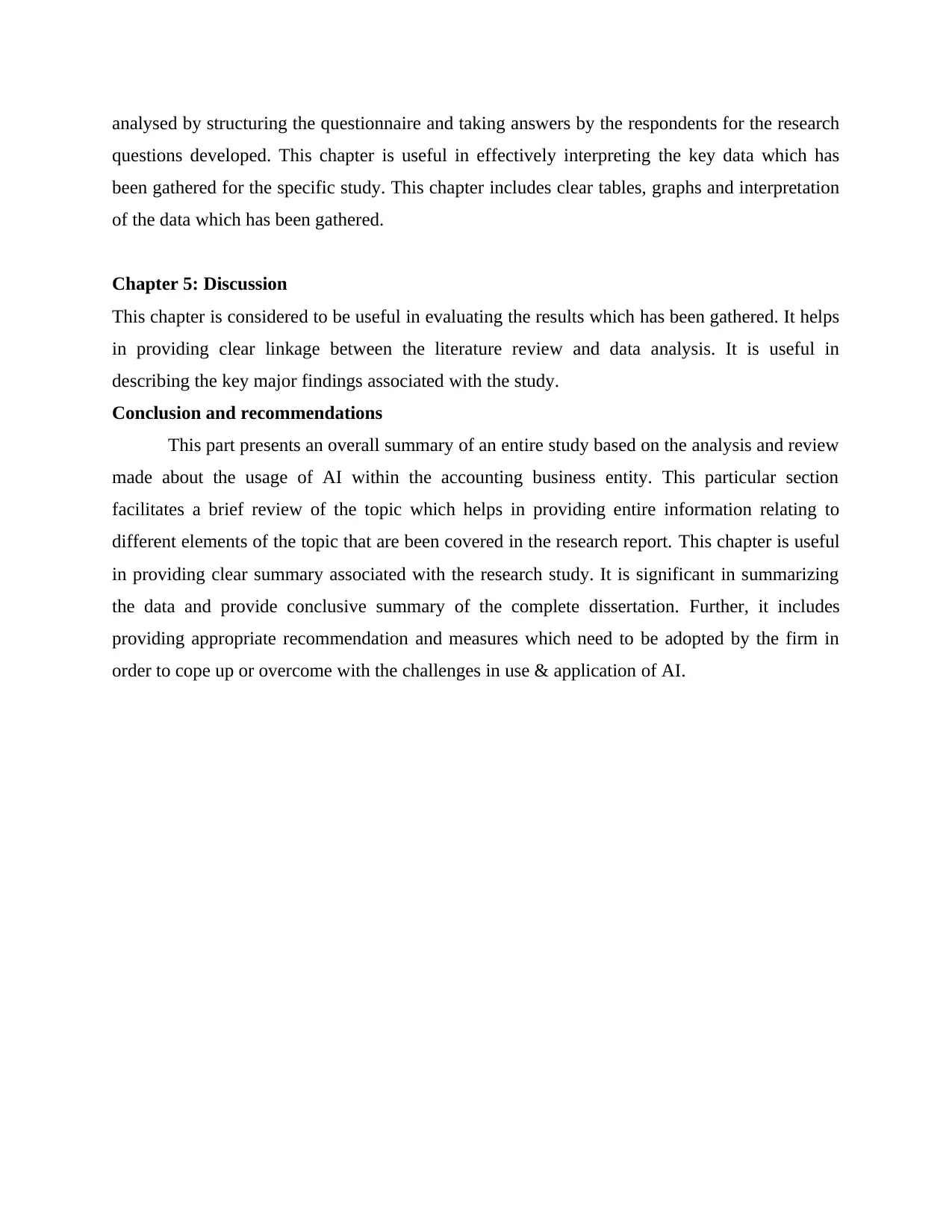
analysed by structuring the questionnaire and taking answers by the respondents for the research
questions developed. This chapter is useful in effectively interpreting the key data which has
been gathered for the specific study. This chapter includes clear tables, graphs and interpretation
of the data which has been gathered.
Chapter 5: Discussion
This chapter is considered to be useful in evaluating the results which has been gathered. It helps
in providing clear linkage between the literature review and data analysis. It is useful in
describing the key major findings associated with the study.
Conclusion and recommendations
This part presents an overall summary of an entire study based on the analysis and review
made about the usage of AI within the accounting business entity. This particular section
facilitates a brief review of the topic which helps in providing entire information relating to
different elements of the topic that are been covered in the research report. This chapter is useful
in providing clear summary associated with the research study. It is significant in summarizing
the data and provide conclusive summary of the complete dissertation. Further, it includes
providing appropriate recommendation and measures which need to be adopted by the firm in
order to cope up or overcome with the challenges in use & application of AI.
questions developed. This chapter is useful in effectively interpreting the key data which has
been gathered for the specific study. This chapter includes clear tables, graphs and interpretation
of the data which has been gathered.
Chapter 5: Discussion
This chapter is considered to be useful in evaluating the results which has been gathered. It helps
in providing clear linkage between the literature review and data analysis. It is useful in
describing the key major findings associated with the study.
Conclusion and recommendations
This part presents an overall summary of an entire study based on the analysis and review
made about the usage of AI within the accounting business entity. This particular section
facilitates a brief review of the topic which helps in providing entire information relating to
different elements of the topic that are been covered in the research report. This chapter is useful
in providing clear summary associated with the research study. It is significant in summarizing
the data and provide conclusive summary of the complete dissertation. Further, it includes
providing appropriate recommendation and measures which need to be adopted by the firm in
order to cope up or overcome with the challenges in use & application of AI.
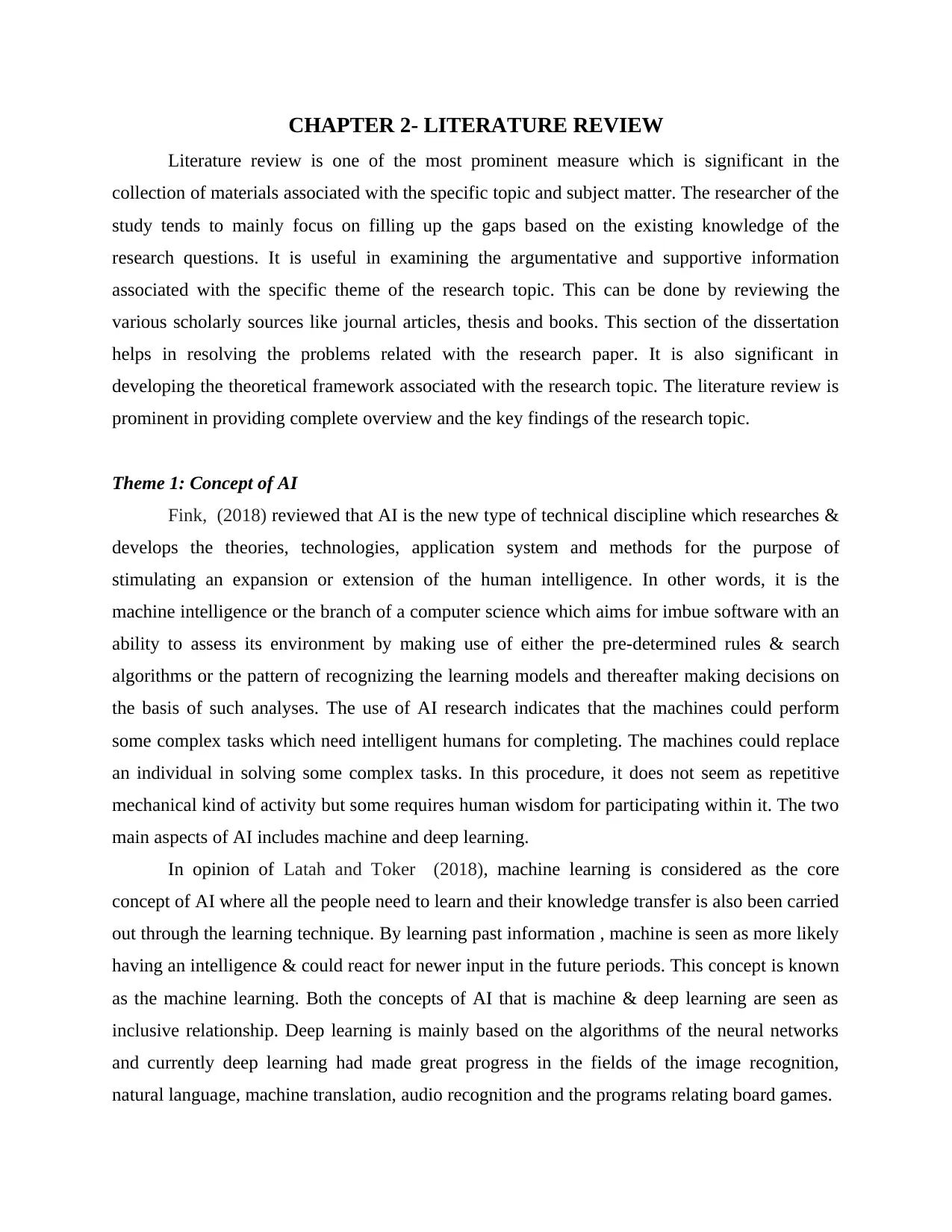
CHAPTER 2- LITERATURE REVIEW
Literature review is one of the most prominent measure which is significant in the
collection of materials associated with the specific topic and subject matter. The researcher of the
study tends to mainly focus on filling up the gaps based on the existing knowledge of the
research questions. It is useful in examining the argumentative and supportive information
associated with the specific theme of the research topic. This can be done by reviewing the
various scholarly sources like journal articles, thesis and books. This section of the dissertation
helps in resolving the problems related with the research paper. It is also significant in
developing the theoretical framework associated with the research topic. The literature review is
prominent in providing complete overview and the key findings of the research topic.
Theme 1: Concept of AI
Fink, (2018) reviewed that AI is the new type of technical discipline which researches &
develops the theories, technologies, application system and methods for the purpose of
stimulating an expansion or extension of the human intelligence. In other words, it is the
machine intelligence or the branch of a computer science which aims for imbue software with an
ability to assess its environment by making use of either the pre-determined rules & search
algorithms or the pattern of recognizing the learning models and thereafter making decisions on
the basis of such analyses. The use of AI research indicates that the machines could perform
some complex tasks which need intelligent humans for completing. The machines could replace
an individual in solving some complex tasks. In this procedure, it does not seem as repetitive
mechanical kind of activity but some requires human wisdom for participating within it. The two
main aspects of AI includes machine and deep learning.
In opinion of Latah and Toker (2018), machine learning is considered as the core
concept of AI where all the people need to learn and their knowledge transfer is also been carried
out through the learning technique. By learning past information , machine is seen as more likely
having an intelligence & could react for newer input in the future periods. This concept is known
as the machine learning. Both the concepts of AI that is machine & deep learning are seen as
inclusive relationship. Deep learning is mainly based on the algorithms of the neural networks
and currently deep learning had made great progress in the fields of the image recognition,
natural language, machine translation, audio recognition and the programs relating board games.
Literature review is one of the most prominent measure which is significant in the
collection of materials associated with the specific topic and subject matter. The researcher of the
study tends to mainly focus on filling up the gaps based on the existing knowledge of the
research questions. It is useful in examining the argumentative and supportive information
associated with the specific theme of the research topic. This can be done by reviewing the
various scholarly sources like journal articles, thesis and books. This section of the dissertation
helps in resolving the problems related with the research paper. It is also significant in
developing the theoretical framework associated with the research topic. The literature review is
prominent in providing complete overview and the key findings of the research topic.
Theme 1: Concept of AI
Fink, (2018) reviewed that AI is the new type of technical discipline which researches &
develops the theories, technologies, application system and methods for the purpose of
stimulating an expansion or extension of the human intelligence. In other words, it is the
machine intelligence or the branch of a computer science which aims for imbue software with an
ability to assess its environment by making use of either the pre-determined rules & search
algorithms or the pattern of recognizing the learning models and thereafter making decisions on
the basis of such analyses. The use of AI research indicates that the machines could perform
some complex tasks which need intelligent humans for completing. The machines could replace
an individual in solving some complex tasks. In this procedure, it does not seem as repetitive
mechanical kind of activity but some requires human wisdom for participating within it. The two
main aspects of AI includes machine and deep learning.
In opinion of Latah and Toker (2018), machine learning is considered as the core
concept of AI where all the people need to learn and their knowledge transfer is also been carried
out through the learning technique. By learning past information , machine is seen as more likely
having an intelligence & could react for newer input in the future periods. This concept is known
as the machine learning. Both the concepts of AI that is machine & deep learning are seen as
inclusive relationship. Deep learning is mainly based on the algorithms of the neural networks
and currently deep learning had made great progress in the fields of the image recognition,
natural language, machine translation, audio recognition and the programs relating board games.
⊘ This is a preview!⊘
Do you want full access?
Subscribe today to unlock all pages.

Trusted by 1+ million students worldwide
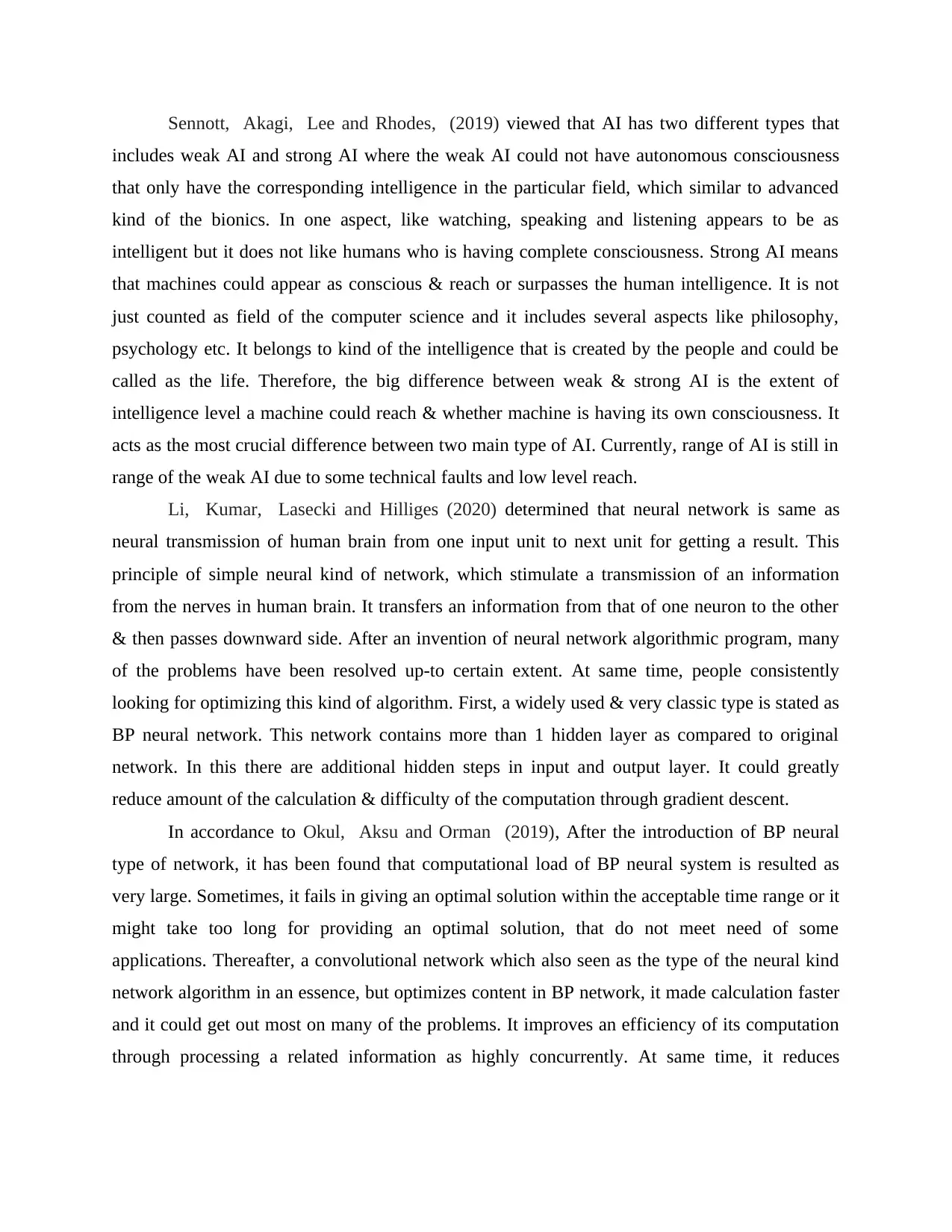
Sennott, Akagi, Lee and Rhodes, (2019) viewed that AI has two different types that
includes weak AI and strong AI where the weak AI could not have autonomous consciousness
that only have the corresponding intelligence in the particular field, which similar to advanced
kind of the bionics. In one aspect, like watching, speaking and listening appears to be as
intelligent but it does not like humans who is having complete consciousness. Strong AI means
that machines could appear as conscious & reach or surpasses the human intelligence. It is not
just counted as field of the computer science and it includes several aspects like philosophy,
psychology etc. It belongs to kind of the intelligence that is created by the people and could be
called as the life. Therefore, the big difference between weak & strong AI is the extent of
intelligence level a machine could reach & whether machine is having its own consciousness. It
acts as the most crucial difference between two main type of AI. Currently, range of AI is still in
range of the weak AI due to some technical faults and low level reach.
Li, Kumar, Lasecki and Hilliges (2020) determined that neural network is same as
neural transmission of human brain from one input unit to next unit for getting a result. This
principle of simple neural kind of network, which stimulate a transmission of an information
from the nerves in human brain. It transfers an information from that of one neuron to the other
& then passes downward side. After an invention of neural network algorithmic program, many
of the problems have been resolved up-to certain extent. At same time, people consistently
looking for optimizing this kind of algorithm. First, a widely used & very classic type is stated as
BP neural network. This network contains more than 1 hidden layer as compared to original
network. In this there are additional hidden steps in input and output layer. It could greatly
reduce amount of the calculation & difficulty of the computation through gradient descent.
In accordance to Okul, Aksu and Orman (2019), After the introduction of BP neural
type of network, it has been found that computational load of BP neural system is resulted as
very large. Sometimes, it fails in giving an optimal solution within the acceptable time range or it
might take too long for providing an optimal solution, that do not meet need of some
applications. Thereafter, a convolutional network which also seen as the type of the neural kind
network algorithm in an essence, but optimizes content in BP network, it made calculation faster
and it could get out most on many of the problems. It improves an efficiency of its computation
through processing a related information as highly concurrently. At same time, it reduces
includes weak AI and strong AI where the weak AI could not have autonomous consciousness
that only have the corresponding intelligence in the particular field, which similar to advanced
kind of the bionics. In one aspect, like watching, speaking and listening appears to be as
intelligent but it does not like humans who is having complete consciousness. Strong AI means
that machines could appear as conscious & reach or surpasses the human intelligence. It is not
just counted as field of the computer science and it includes several aspects like philosophy,
psychology etc. It belongs to kind of the intelligence that is created by the people and could be
called as the life. Therefore, the big difference between weak & strong AI is the extent of
intelligence level a machine could reach & whether machine is having its own consciousness. It
acts as the most crucial difference between two main type of AI. Currently, range of AI is still in
range of the weak AI due to some technical faults and low level reach.
Li, Kumar, Lasecki and Hilliges (2020) determined that neural network is same as
neural transmission of human brain from one input unit to next unit for getting a result. This
principle of simple neural kind of network, which stimulate a transmission of an information
from the nerves in human brain. It transfers an information from that of one neuron to the other
& then passes downward side. After an invention of neural network algorithmic program, many
of the problems have been resolved up-to certain extent. At same time, people consistently
looking for optimizing this kind of algorithm. First, a widely used & very classic type is stated as
BP neural network. This network contains more than 1 hidden layer as compared to original
network. In this there are additional hidden steps in input and output layer. It could greatly
reduce amount of the calculation & difficulty of the computation through gradient descent.
In accordance to Okul, Aksu and Orman (2019), After the introduction of BP neural
type of network, it has been found that computational load of BP neural system is resulted as
very large. Sometimes, it fails in giving an optimal solution within the acceptable time range or it
might take too long for providing an optimal solution, that do not meet need of some
applications. Thereafter, a convolutional network which also seen as the type of the neural kind
network algorithm in an essence, but optimizes content in BP network, it made calculation faster
and it could get out most on many of the problems. It improves an efficiency of its computation
through processing a related information as highly concurrently. At same time, it reduces
Paraphrase This Document
Need a fresh take? Get an instant paraphrase of this document with our AI Paraphraser
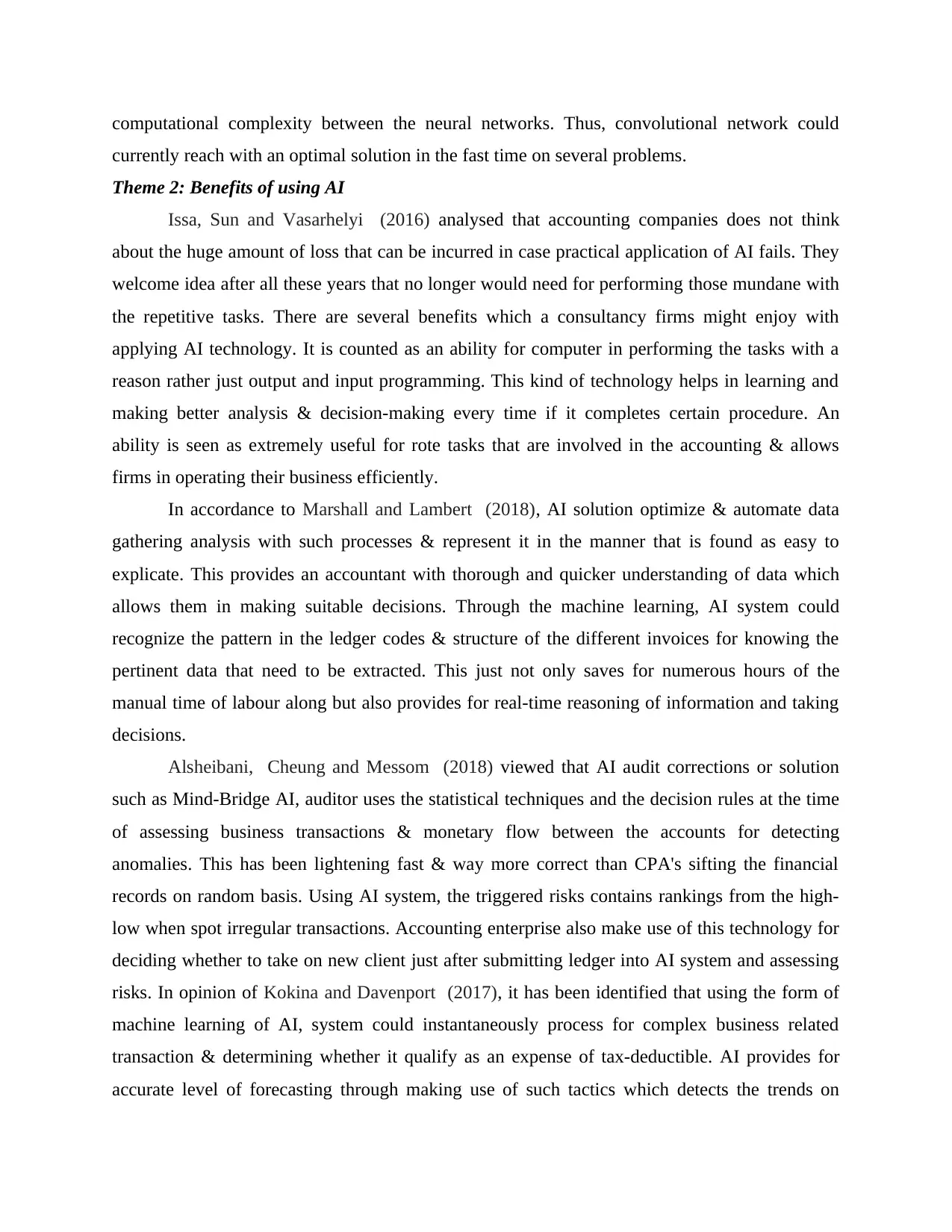
computational complexity between the neural networks. Thus, convolutional network could
currently reach with an optimal solution in the fast time on several problems.
Theme 2: Benefits of using AI
Issa, Sun and Vasarhelyi (2016) analysed that accounting companies does not think
about the huge amount of loss that can be incurred in case practical application of AI fails. They
welcome idea after all these years that no longer would need for performing those mundane with
the repetitive tasks. There are several benefits which a consultancy firms might enjoy with
applying AI technology. It is counted as an ability for computer in performing the tasks with a
reason rather just output and input programming. This kind of technology helps in learning and
making better analysis & decision-making every time if it completes certain procedure. An
ability is seen as extremely useful for rote tasks that are involved in the accounting & allows
firms in operating their business efficiently.
In accordance to Marshall and Lambert (2018), AI solution optimize & automate data
gathering analysis with such processes & represent it in the manner that is found as easy to
explicate. This provides an accountant with thorough and quicker understanding of data which
allows them in making suitable decisions. Through the machine learning, AI system could
recognize the pattern in the ledger codes & structure of the different invoices for knowing the
pertinent data that need to be extracted. This just not only saves for numerous hours of the
manual time of labour along but also provides for real-time reasoning of information and taking
decisions.
Alsheibani, Cheung and Messom (2018) viewed that AI audit corrections or solution
such as Mind-Bridge AI, auditor uses the statistical techniques and the decision rules at the time
of assessing business transactions & monetary flow between the accounts for detecting
anomalies. This has been lightening fast & way more correct than CPA's sifting the financial
records on random basis. Using AI system, the triggered risks contains rankings from the high-
low when spot irregular transactions. Accounting enterprise also make use of this technology for
deciding whether to take on new client just after submitting ledger into AI system and assessing
risks. In opinion of Kokina and Davenport (2017), it has been identified that using the form of
machine learning of AI, system could instantaneously process for complex business related
transaction & determining whether it qualify as an expense of tax-deductible. AI provides for
accurate level of forecasting through making use of such tactics which detects the trends on
currently reach with an optimal solution in the fast time on several problems.
Theme 2: Benefits of using AI
Issa, Sun and Vasarhelyi (2016) analysed that accounting companies does not think
about the huge amount of loss that can be incurred in case practical application of AI fails. They
welcome idea after all these years that no longer would need for performing those mundane with
the repetitive tasks. There are several benefits which a consultancy firms might enjoy with
applying AI technology. It is counted as an ability for computer in performing the tasks with a
reason rather just output and input programming. This kind of technology helps in learning and
making better analysis & decision-making every time if it completes certain procedure. An
ability is seen as extremely useful for rote tasks that are involved in the accounting & allows
firms in operating their business efficiently.
In accordance to Marshall and Lambert (2018), AI solution optimize & automate data
gathering analysis with such processes & represent it in the manner that is found as easy to
explicate. This provides an accountant with thorough and quicker understanding of data which
allows them in making suitable decisions. Through the machine learning, AI system could
recognize the pattern in the ledger codes & structure of the different invoices for knowing the
pertinent data that need to be extracted. This just not only saves for numerous hours of the
manual time of labour along but also provides for real-time reasoning of information and taking
decisions.
Alsheibani, Cheung and Messom (2018) viewed that AI audit corrections or solution
such as Mind-Bridge AI, auditor uses the statistical techniques and the decision rules at the time
of assessing business transactions & monetary flow between the accounts for detecting
anomalies. This has been lightening fast & way more correct than CPA's sifting the financial
records on random basis. Using AI system, the triggered risks contains rankings from the high-
low when spot irregular transactions. Accounting enterprise also make use of this technology for
deciding whether to take on new client just after submitting ledger into AI system and assessing
risks. In opinion of Kokina and Davenport (2017), it has been identified that using the form of
machine learning of AI, system could instantaneously process for complex business related
transaction & determining whether it qualify as an expense of tax-deductible. AI provides for
accurate level of forecasting through making use of such tactics which detects the trends on
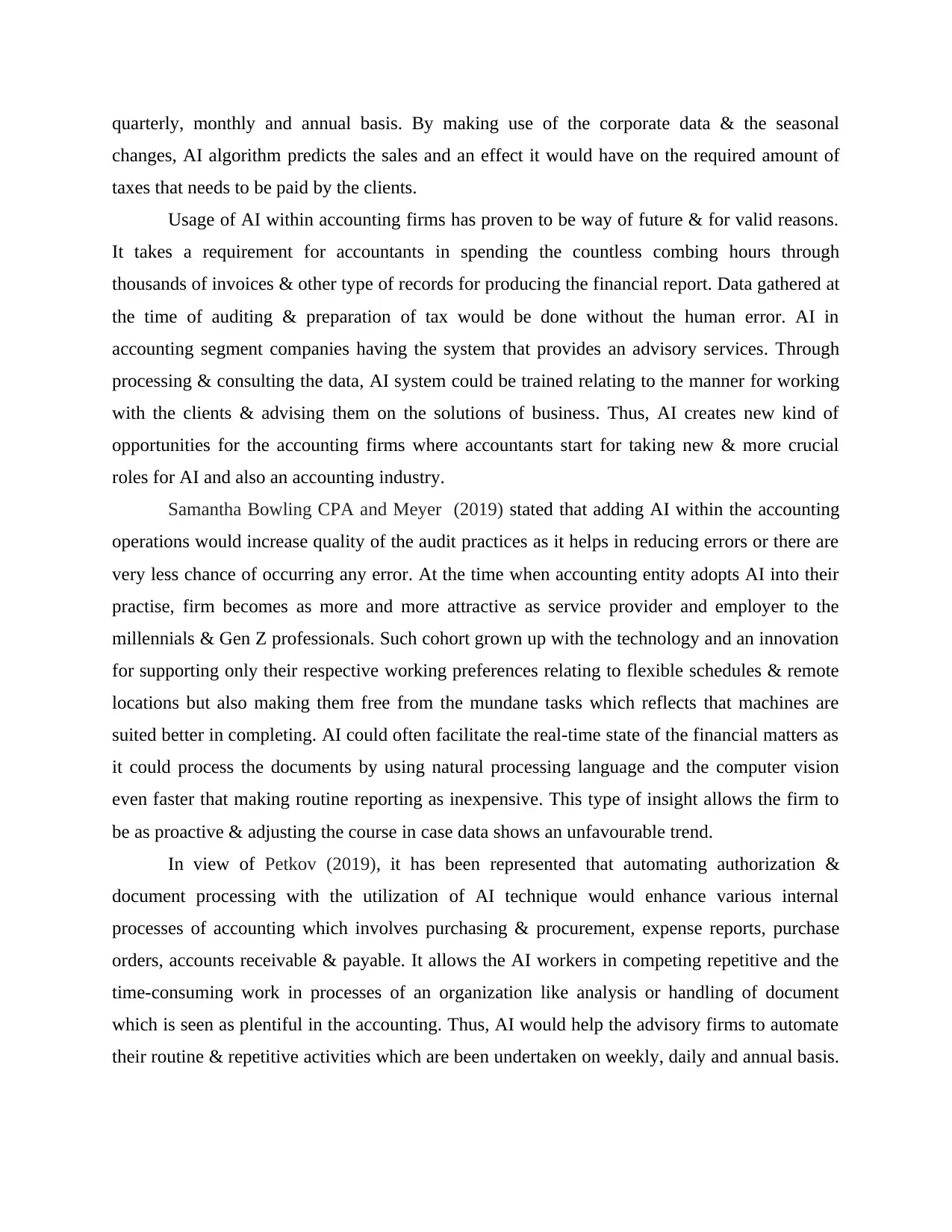
quarterly, monthly and annual basis. By making use of the corporate data & the seasonal
changes, AI algorithm predicts the sales and an effect it would have on the required amount of
taxes that needs to be paid by the clients.
Usage of AI within accounting firms has proven to be way of future & for valid reasons.
It takes a requirement for accountants in spending the countless combing hours through
thousands of invoices & other type of records for producing the financial report. Data gathered at
the time of auditing & preparation of tax would be done without the human error. AI in
accounting segment companies having the system that provides an advisory services. Through
processing & consulting the data, AI system could be trained relating to the manner for working
with the clients & advising them on the solutions of business. Thus, AI creates new kind of
opportunities for the accounting firms where accountants start for taking new & more crucial
roles for AI and also an accounting industry.
Samantha Bowling CPA and Meyer (2019) stated that adding AI within the accounting
operations would increase quality of the audit practices as it helps in reducing errors or there are
very less chance of occurring any error. At the time when accounting entity adopts AI into their
practise, firm becomes as more and more attractive as service provider and employer to the
millennials & Gen Z professionals. Such cohort grown up with the technology and an innovation
for supporting only their respective working preferences relating to flexible schedules & remote
locations but also making them free from the mundane tasks which reflects that machines are
suited better in completing. AI could often facilitate the real-time state of the financial matters as
it could process the documents by using natural processing language and the computer vision
even faster that making routine reporting as inexpensive. This type of insight allows the firm to
be as proactive & adjusting the course in case data shows an unfavourable trend.
In view of Petkov (2019), it has been represented that automating authorization &
document processing with the utilization of AI technique would enhance various internal
processes of accounting which involves purchasing & procurement, expense reports, purchase
orders, accounts receivable & payable. It allows the AI workers in competing repetitive and the
time-consuming work in processes of an organization like analysis or handling of document
which is seen as plentiful in the accounting. Thus, AI would help the advisory firms to automate
their routine & repetitive activities which are been undertaken on weekly, daily and annual basis.
changes, AI algorithm predicts the sales and an effect it would have on the required amount of
taxes that needs to be paid by the clients.
Usage of AI within accounting firms has proven to be way of future & for valid reasons.
It takes a requirement for accountants in spending the countless combing hours through
thousands of invoices & other type of records for producing the financial report. Data gathered at
the time of auditing & preparation of tax would be done without the human error. AI in
accounting segment companies having the system that provides an advisory services. Through
processing & consulting the data, AI system could be trained relating to the manner for working
with the clients & advising them on the solutions of business. Thus, AI creates new kind of
opportunities for the accounting firms where accountants start for taking new & more crucial
roles for AI and also an accounting industry.
Samantha Bowling CPA and Meyer (2019) stated that adding AI within the accounting
operations would increase quality of the audit practices as it helps in reducing errors or there are
very less chance of occurring any error. At the time when accounting entity adopts AI into their
practise, firm becomes as more and more attractive as service provider and employer to the
millennials & Gen Z professionals. Such cohort grown up with the technology and an innovation
for supporting only their respective working preferences relating to flexible schedules & remote
locations but also making them free from the mundane tasks which reflects that machines are
suited better in completing. AI could often facilitate the real-time state of the financial matters as
it could process the documents by using natural processing language and the computer vision
even faster that making routine reporting as inexpensive. This type of insight allows the firm to
be as proactive & adjusting the course in case data shows an unfavourable trend.
In view of Petkov (2019), it has been represented that automating authorization &
document processing with the utilization of AI technique would enhance various internal
processes of accounting which involves purchasing & procurement, expense reports, purchase
orders, accounts receivable & payable. It allows the AI workers in competing repetitive and the
time-consuming work in processes of an organization like analysis or handling of document
which is seen as plentiful in the accounting. Thus, AI would help the advisory firms to automate
their routine & repetitive activities which are been undertaken on weekly, daily and annual basis.
⊘ This is a preview!⊘
Do you want full access?
Subscribe today to unlock all pages.

Trusted by 1+ million students worldwide
1 out of 52
Related Documents
Your All-in-One AI-Powered Toolkit for Academic Success.
+13062052269
info@desklib.com
Available 24*7 on WhatsApp / Email
![[object Object]](/_next/static/media/star-bottom.7253800d.svg)
Unlock your academic potential
Copyright © 2020–2026 A2Z Services. All Rights Reserved. Developed and managed by ZUCOL.





